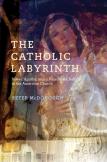Things Fall Together
Many retreat houses feature a labyrinth; pilgrims wend their way through a circuitous though orderly route, metaphorically tracing the ever ancient, ever new challenge of cultivating union with a mysterious deity. By contrast, Peter McDonough’s The Catholic Labyrinth, a book that sketches a spectrum of conflicting forces and divergent trends within the church in the United States, depicts American Catholicism as a bewildering maze shaped by an immeasurably diverse set of “individual decisions and pell-mell adaptations.” One gets the sense of simultaneous movement in multiple directions, and at times it seems pertinent to wonder where indeed God may be amid the discord. As the subtitle asserts, this is a book largely about power and the struggle for power among a variety of competing American Catholic entities and interests.
The author of two previous studies on U.S. Jesuits, McDonough’s acute understanding of institutional structure and organizational dynamics is at work throughout. Though he highlights major trends like the ongoing Latin-Americanization of U.S. Catholicism and the broad influence of individualism on the spiritual commitments of the baptized, he spends more time exploring the influence of groups and leaders, including First Things, founded by the Rev. Richard John Neuhaus; FutureChurch, headed by Sister Christine Shenk; and the Survivors Network of those Abused by Priests (SNAP), whose spokesman is David Clohessy. As he scans the contemporary horizon, he adverts to a familiar narrative. The perceived excesses of the long decade of the 1960s galvanized and united forces of theological and political retrenchment even as theological and political progressives splintered and diminished in influence.
Thus, McDonough concludes that though Voice of the Faithful (V.O.T.F.) may have seemed vital at its 2002 birth, the group’s inchoate structure—vestiges of its grassroots origins and preference for consensus-based decision-making—ultimately enabled hierarchical authorities to ignore it and relegated the organization to a place “at the margin of the game.” On the other hand, the Knights of Columbus, with its massive bankroll and robust executive leadership, could easily seize the moment last year to speak on Catholics’ behalf, loudly decrying the implementation of Obamacare as a threat to religious liberty.
How influential are these organizations? As it turns out, even highly organized and monied interests seem ineffectual if measured by their impact on rank-and-file Catholics, a population decidedly apathetic about internal church affairs. But the more organized and wealthy a group is, the more likely it is to win attention and influence among leading figures in the hierarchy—a point widely intuited, but one that McDonough rightly highlights.
One of McDonough’s more valuable contributions is his sketch of the National Leadership Roundtable on Church Man-agement, an organization founded by the business executive Geoffrey Boisi and designed to advise and support church officials in the implementation of organizational and fiscal best practices. The roundtable brings together wealthy benefactors, management experts, bishops, and leaders in a variety of ministries to identify and inculcate “standards for excellence” in church-sponsored institutions. Among the roundtable’s core principles is a commitment to prescind from what McDonough calls “theological bickering,” a strategic choice designed to maximize its “solutions-oriented” impact. Nevertheless, the truth is that the church’s decentralized organizational culture—each bishop a prince in his diocese, each parish a microcosm unto itself—remains a considerable challenge even for the well-structured, well-funded roundtable.
Each organized effort to shape the church or become its public voice—think William Donohue’s Catholic League for Religious and Civil Rights—plays out against a backdrop of ongoing Catholic deinstitutionalization, which may mean we are headed toward some version of an American Catholic Wild West. For decades, we have witnessed the boarding up of parishes and schools that once served as the vital backbone of local communities. Where these institutions survive, whether in the cities or the suburbs, they rarely possess the kind of influence and loyalty they once had. At the same time, Catholic social service and health care initiatives, frequently dependent upon government funding for their existence, face the difficult task of maintaining a visible Catholic identity while complying with an array of state and federal requirements. Add to this the notably diminished authority that ordained leaders, especially bishops, have among the faithful. Notably, McDonough suggests that, in this context, a strategy emphasizing the distinctiveness of church teaching on sexuality and gender may have the advantage of affirming Catholic difference, but that it will ultimately fail as a compelling plan for ensuring long-term institutional vitality.
This study is itself labyrinthine and occasionally has the feel of not fully digested notes for a book. Though his endorsement of such things as a married priesthood and women’s ordination seems clear, McDonough offers no comprehensive plan for the future. Yet the book has the advantage of offering a bird’s-eye view that encompasses a great deal while not sparing complexity. For those invested in the American church’s future, it is a sobering and valuable read, though not an especially heartening one.
This article also appeared in print, under the headline “Things Fall Together,” in the September 30, 2013, issue.








